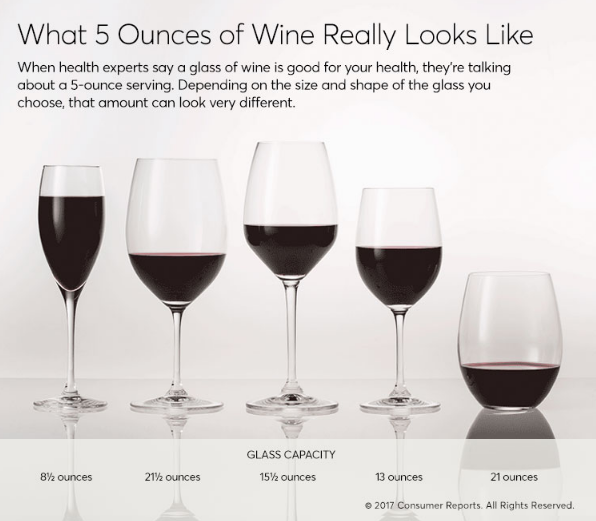In nearly every scientific study, any purported benefits associated with drinking specifically revolve around moderate consumption. For some people, moderate consumption equates to one glass, which is 5 ounces.
Because wine glasses come in different shapes and sizes, judging when you have poured enough can be difficult. To help, the image below shows you what 5 ounces of wine looks like in different glasses.

Photo: Wadyka, Sally. What 5 Ounces of Wine Really Looks Like. Digital image. Consumer Reports. 18 Feb. 2017. Web.
Now that you know what the recommended amount of wine looks like, begin reaping all its health benefits.
Reduces Heart-Attack Risk
After observing 11,711 men for 16 years, a study found that those suffering from high blood pressure were 30% less likely to have a heart attack if they drank in moderation. The Harvard School of Public Health study published their findings in Annals of Internal Medicine, 2007.
Lowers Risk of Heart Disease
Research has found that red wine tannins contain procyanidins, which protect against heart disease. The study, published in Nature by the Queen Mary University in London in 2006, revealed that wines from Sardinia and southwest France have more procyanidins than other wines.
Reduces Risk of Type 2 Diabetes
Published in Diabetes Care, Amsterdam’s VU University Medical Center studied 369,862 individuals over an average of 12 years each. According to their research, moderate drinkers have 30 percent less chance of developing type 2 diabetes than nondrinkers.
Lowers Risk of Stroke
Published in Stroke, a study, conducted by Columbia University, followed 3,176 individuals over eight years. After the study period, researchers found significant benefits to alcohol. When consumed in moderation, wine can reduce the possibility of suffering a blood clot-related stroke by about 50 percent.
Reduces Risk of Cataracts
Published in Nature, researchers studied 1,379 participants from Iceland to ascertain if alcohol prevents cataracts. Compared to nondrinkers, moderate drinkers have a 32% less chance of getting cataracts. Additionally, those who drink wine are 43% less likely to develop cataracts than those primarily drinking beer.
Cuts Risk of Colon Cancer
Stony Brook University conducted a study involving 2,291 individuals over four years. Their results, published in the American Journal of Gastroenterology, found that moderate consumption of red wine reduces the risk of colon cancer by 45%.
Slows Brain Decline
Interestingly, brain function declines at a noticeably faster rate in non-drinkers than in moderate drinkers. The supporting research, involving 1,416 participants, was published in Neuroepidemiology by Columbia University.
Promotes Longevity
Out of 2,468 men studied over 29 years, those who drank wine had a 34% lower mortality rate than beer or spirit drinkers. The Finnish study published their results in the Journals of Gerontology, 2007.
New Research on Wine’s Impact on Gut Health and Inflammation
Emerging studies have begun to highlight a new potential benefit of moderate wine consumption: its positive influence on gut microbiota and inflammation reduction. A study published in Gastroenterology in 2019 by researchers from King’s College London analyzed data from nearly 3,000 twins and found that individuals who drank red wine in moderation had a more diverse and healthy gut microbiome compared to non-drinkers. This diversity is a key marker of good gut health, linked to a stronger immune system, better weight regulation, and lower levels of bad cholesterol.
The polyphenols in red wine—natural compounds found in grape skins—are believed to act as prebiotics, feeding beneficial gut bacteria. These compounds are not fully absorbed in the stomach or small intestine and instead reach the colon, where they encourage the growth of microbiota that support digestion and overall health. This microbial activity can reduce markers of systemic inflammation, which connects to a variety of chronic diseases including cardiovascular conditions, obesity, and even certain cancers.
In a separate study published in the American Journal of Clinical Nutrition, researchers discovered that moderate red wine consumption was associated with lower levels of C-reactive protein (CRP), an inflammatory marker linked to heart disease and other inflammatory disorders. These findings suggest that moderate wine intake might offer anti-inflammatory benefits that complement its previously documented cardiovascular advantages.
Still, while these results are promising, they do not warrant unrestrained consumption. Experts continue to caution that the benefits of wine must be weighed carefully against the risks, especially for individuals with a history of alcohol dependency or liver conditions. Furthermore, the benefits identified are most strongly associated with red wine rather than white or sparkling varieties due to the higher concentration of beneficial polyphenols in red wine.
As ongoing research continues to refine our understanding, it remains clear that wine’s health benefits are complex and dependent on responsible consumption.
Reminders
Remember that moderation is key when consuming wine or any other kind of alcohol. For it to be healthful, stick to the 5-ounce serving. Moreover, ask your doctor if wine consumption is okay, especially if you take certain prescription drugs. Lastly, make sure you are fully covered medically and financially by contacting a licensed agent today. They can help you find the health plan that is right for you!
Have Health Insurance Questions?
We hope that this information on wine is helpful for you.
Insurance is oftentimes overwhelming, and we want to shed light on the industry by answering your questions. Comment below and your question may be the topic of our next post!
If you liked this article, share it with your friends!
Empower Brokerage wants to help you find the insurance coverage you need and help you save money getting it. Stay on top of your health and give us a call at (844) 410-1320.
Get affordable health insurance quotes by clicking here.
See our other websites:
This article was updated on 5/30/2025.




I blog frequently and I seriously want to thank you for the detailed information. This article has really piqued my interest. I’m going to take a note of your site and keep checking for new information about once per week.